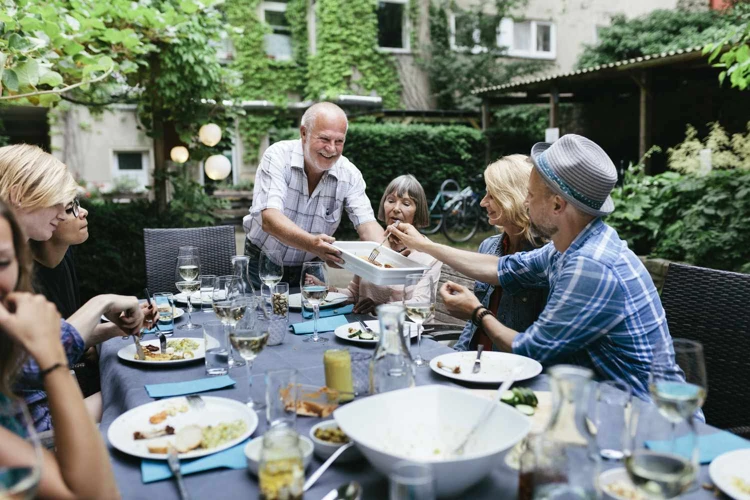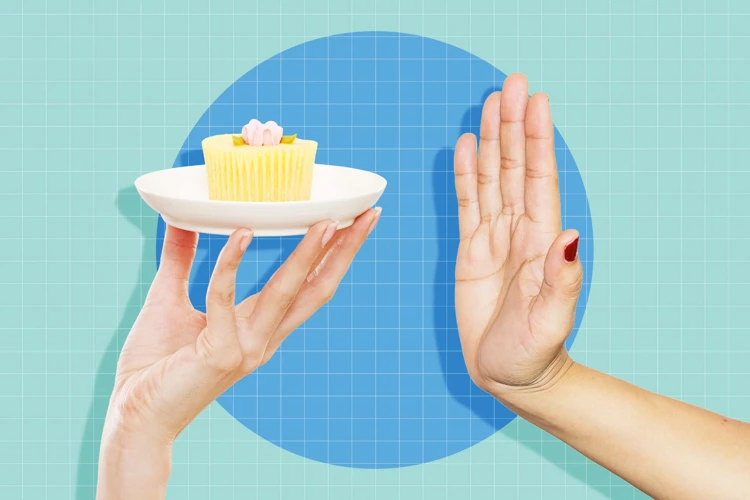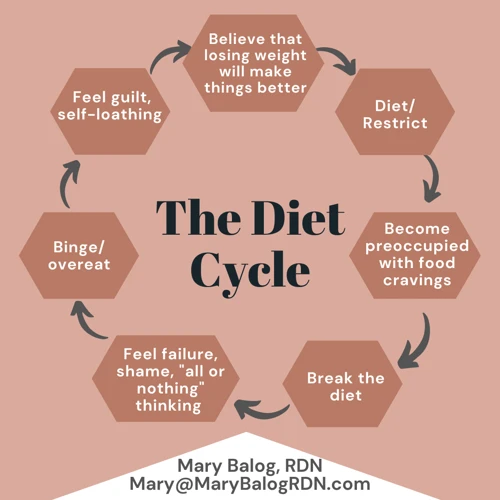Stepping into a social situation comes with its own set of intricacies, and one of the most common involves declining food. While it may seem like a simple gesture, refusing food offered by someone can quickly become a complex interaction filled with questions of politeness and social norms. However, it is possible to gracefully reject food without offending the hosts or other guests. In this guide, we’ll dive into the art of politely declining food in social situations while highlighting key steps to help ensure a pleasant and comfortable experience for everyone involved.
Understand Your Goals

Before figuring out how to politely decline food offered by others, it’s important to understand your own goals and limits in regards to your diet and lifestyle choices. It can be perplexing to navigate social situations where food is a central part of the gathering, but staying true to your values and maintaining a healthy relationship with food is crucial. By knowing your own boundaries and motivations, you can approach tricky social situations with confidence and grace.
Know Your Limits
Knowing your limits is an important aspect of politely declining food offered by others in social situations. You don’t want to come across as impolite or ungrateful, but at the same time, you don’t want to compromise your health or dietary choices. It’s important to set boundaries for yourself and understand what you can and cannot eat.
One way to do this is by making a list of foods that you cannot eat due to dietary restrictions or health concerns. It’s important to be honest with yourself and your hosts about your limitations, as pretending to be able to eat certain foods may lead to discomfort or allergic reactions. You can also note foods that you prefer not to eat, such as those you simply don’t enjoy or that conflict with your ethical or environmental values.
It’s important to consider your personal goals and motivations for declining certain foods. Maybe you’re trying to lose weight, manage a health condition, or follow a specific diet or lifestyle. Knowing these reasons can help you stay focused on your goals and feel more confident in politely declining certain foods.
Knowing your limits can also help you plan ahead for social situations. For example, if you know that a certain restaurant or type of cuisine is not compatible with your dietary needs, you can suggest an alternative location or offer to bring your own dish. This way, you can still enjoy the social aspect of the gathering without compromising your health or values.
| Tip | Example |
| Be honest with yourself about your limitations | Make a list of foods you cannot or prefer not to eat |
| Consider your personal goals and motivations | Reflect on why you’re declining certain foods and stay committed to your goals |
| Plan ahead for social situations | Suggest alternative locations or offer to bring your own dish |
Motivate Yourself
Motivating yourself to decline food offered by others can be challenging, especially when a social situation makes it difficult to stick to your goals. However, there are several techniques you can use to keep yourself motivated and focused.
1. Remind yourself of your goals: Before attending a social event, take a moment to remind yourself of why you’ve chosen to decline food. Whether it’s for health reasons, personal preference or religious beliefs, keeping your end goal in mind can be a powerful motivator.
2. Visualize your success: Try to picture yourself declining food confidently and politely in a social situation. This visualization technique can help you feel more capable and prepared to handle any food offers that come your way.
3. Celebrate small wins: Each time you successfully decline food in a social situation, take a moment to acknowledge and celebrate your success. This positive reinforcement can help keep you motivated to continue making healthy choices.
4. Seek inspiration: Look for inspiration from others who have successfully declined food in social situations. This could be a friend or family member, a role model or even a social media influencer. Hearing about their success can help you feel more motivated and confident in your own abilities.
5. Stay positive: Lastly, try to maintain a positive attitude about your decision to decline food. Rather than feeling like you’re missing out, focus on the opportunities to connect with others and enjoy the social event without indulging in food. A positive mindset can make it easier to stick to your goals and decline food politely in social situations.
Preparing for Social Events

Social events are a great opportunity to connect with others and enjoy some delicious food. However, for those with dietary restrictions, attending social events can be a source of stress and anxiety. It can be challenging to navigate the social expectations around food while also sticking to one’s dietary needs. That’s why it’s crucial to prepare ahead of time and have a plan in place to help manage these situations with ease. With a little bit of preparation and communication, you can enjoy social events while keeping your dietary needs in mind. Let’s explore some strategies for preparing for social events so that you can feel confident and comfortable in these situations.
Eat Beforehand
One effective way to avoid the awkwardness of declining food offered by others in social situations is to eat beforehand. This can be particularly helpful for individuals who have dietary restrictions or may not enjoy certain types of foods.
The benefits of eating beforehand include:
| Advantages | Explanation |
| Feeling full | By eating a meal or snack prior to a social event, individuals are more likely to feel full and less tempted to indulge in unhealthy or undesirable foods. |
| Saving money | Bringing your own food or eating before can save you money by avoiding restaurant or catering costs. |
| Reducing anxiety | Individuals who struggle with anxiety around social situations may feel more confident and at ease by not having to worry about what they will eat or declining offers for food. |
Eating beforehand can be a simple and effective way to avoid uncomfortable situations and stick to personal dietary goals.
Bring a Dish
When preparing for social events where food will be offered, one way to ensure that there will be something that fits your dietary preferences is by bringing a dish. Not only does this guarantee that you will have a food option to consume, but it’s also a polite gesture to the host or hostess.
Before deciding on what dish to bring, it’s important to consider any dietary restrictions of the other guests that may be attending the event. This will help ensure that your dish can be enjoyed by everyone. Some safe options may include a veggie platter with dip, a fruit salad, or a side dish such as roasted vegetables.
Another consideration when bringing a dish is the presentation. Be sure to choose an aesthetically pleasing dish that looks appetizing, as this will entice other guests to try it. Additionally, bringing your own dish allows you the opportunity to share your preferred eating habits and potentially spark a conversation about your nutrition goals.
When bringing a dish, it’s also a good idea to label it with the ingredients included. This helps guests with any allergies or dietary restrictions to know what is safe for them to eat. A simple way to do this is by including index cards that list the dish name and ingredients next to it.
Bringing a dish to social events is a simple and effective way to ensure that there will be a food option that fits your dietary preferences while also being considerate to the other guests. By choosing a dish that is visually appealing and fits dietary restrictions, you can give yourself and others the opportunity to explore new and healthy eating habits.
Communicate with Hosts
Preparing for a social event can be stressful, especially if you have dietary restrictions or preferences. One way to alleviate this stress is to communicate with the hosts beforehand. This will not only help you understand what food options will be available but also allow you to discuss your needs and concerns with the hosts. Here are some tips for effectively communicating with your hosts:
| Tip 1 | Let your hosts know in advance about your dietary restrictions or preferences. This can be done through a phone call, email, or text message. However, it’s important to do so in a polite and respectful manner. |
| Tip 2 | Ask your hosts if they need any assistance in preparing the meal. This can be a great opportunity to bring a dish that fits your dietary needs, or to help with preparations. This will not only show your commitment but also alleviate some of the burden off the hosts. |
| Tip 3 | Don’t assume that your needs will be met, even if you have communicated clearly with the host. Bring some food options that you can eat just in case or plan on eating before or after the event, just to be safe. This will also avoid imposing any additional burden on the host. |
| Tip 4 | Express your gratitude to the hosts for accommodating your needs. A simple thank you message or a note of appreciation can go a long way and will show your hosts that you value their efforts. |
Remember, communicating with your hosts can help alleviate some of the stress of attending a social event, but it’s important to do so in a respectful and polite manner. By following these tips, you can ensure that your needs are met while also being considerate of your hosts’ efforts.
Politely Declining Food

When attending social events, it is not uncommon for others to offer you food that may not align with your dietary preferences or restrictions. While it’s important to be gracious and polite when declining food, it can sometimes be challenging to navigate these situations. Here are some tips on how to decline food offered by others in a considerate manner.
Be Polite
Being polite is essential when declining food offered by others in social situations. It’s important to show appreciation for the offer while kindly refusing it. Here are some ways to be polite while declining food:
| Phrase | Explanation |
| “Thank you, but I’m good for now.” | Express gratitude for the offer, but decline. |
| “Oh, that looks delicious, but I couldn’t possibly eat another thing.” | Compliment the food, but politely decline. |
| “I appreciate the offer, but I’m trying to watch what I eat.” | Show appreciation, but explain why you are declining. |
Using phrases like these can help you decline food without offending the host or other guests. Remember, being polite and respectful is key in any social situation.
Provide an Explanation
It’s important to provide an explanation when declining food offered by others in social situations. This helps to avoid any misunderstandings and shows respect for the person offering the food. You don’t have to go into great detail, but giving a brief explanation can go a long way in avoiding hurt feelings. Here are a few examples of polite explanations you can use:
- Medical reasons: If you have a medical condition that prevents you from eating certain foods, explain this to the person offering. For example, “I’m sorry, I can’t eat anything with gluten because I have celiac disease.”
- Dietary restrictions: If you have chosen to follow a certain diet, it’s okay to let the person offering know. For example, “Thank you so much for offering, but I am a vegetarian and don’t eat meat.”
- Previous meals: If you have already eaten or are planning to eat later, you can let the person know. For example, “I appreciate your offer, but I ate a big lunch earlier and don’t want to spoil my appetite for dinner.”
- Preferences: It’s okay to simply not want to eat a certain food. Just be honest and polite. For example, “I’m sorry, I’m just not a fan of sushi.”
Remember, providing an explanation is all about being respectful and considerate of the person offering the food. By giving a brief explanation, you can politely decline while still showing your appreciation for the gesture.
Offer Alternatives
One effective way to politely decline food in a social situation is by offering alternatives. The key is to make sure you are still being considerate and respectful of your host’s efforts, even if you are not able to eat the food being offered. Here are some potential alternatives to suggest:
- Suggest a Drink: If you are declining an offer of food at a party or gathering, you can always ask for a drink instead. This could be something as simple as a glass of water or a soft drink.
- Bring Your Own Snacks: Another option is to bring your own snacks or appetizers to the event. This way, you can still munch on something without compromising your dietary needs or restrictions.
- Offer to Help: If your host is insistent that you try their food, you can always offer to help in the kitchen or with other aspects of the party. This way, you can still be involved and engaged without having to eat the food directly.
- Express Gratitude: Finally, it is always important to express genuine gratitude and appreciation for your host’s hospitality. Thank them for the offer and acknowledge that you would love to try their food under different circumstances, but that your current dietary needs or restrictions make it challenging.
By providing your host with these alternatives, you can avoid any awkwardness or discomfort during social events while still maintaining your dietary goals.
Handling Peer Pressure
Facing peer pressure when declining food can be a daunting experience, especially when one is committed to maintaining healthy eating habits. It’s not uncommon to feel perplexed or even overwhelmed by the situation. However, it’s important to remember that staying true to our goals is crucial to maintaining our physical and mental well-being. In this section, we will explore some practical strategies that can help us handle peer pressure in social situations where food is involved.
Stay Strong
One of the most difficult challenges in declining food offered by others in social situations is the pressure from peers to conform. It can be challenging to stick to your goals and politely decline food when others are urging you to eat. However, it’s important to remember that you are in control of your body and what you put into it.
Here are some tips for staying strong in the face of peer pressure:
- Remind yourself of your goals: Whether you’re avoiding certain foods for health reasons or personal beliefs, it’s important to remember why you made this decision in the first place. Focus on your goals and remind yourself why they matter to you.
- Be confident in your decision: Confidence is key when it comes to handling peer pressure. If you confidently decline food, others are more likely to respect your decision. Remember that it’s okay to say no if it’s what’s best for you.
- Have a response prepared: Anticipate peer pressure and have a response prepared in advance. For example, you might say, “No thank you, but I appreciate the offer,” or “I’m good, but I’ll definitely try some next time.”
- Find a supportive friend: Having a supportive friend can make all the difference in handling peer pressure. Talk to a friend beforehand and let them know why you’re declining certain foods. Ask for their support and help in sticking to your goals.
- Practice mindfulness: Staying mindful of your goals and how certain foods make you feel can help you resist peer pressure. Take a moment to pause and consider whether this food is aligned with your goals and values.
Remember, staying strong in the face of peer pressure can be difficult, but it’s important to prioritize your health and well-being. Stick to your goals, be confident in your decisions, and find support when you need it.
Stick to Your Goals
When dealing with peer pressure, it’s essential to stick to your goals. Remember why you’ve set these goals in the first place and the benefits they bring. It’s not just about avoiding certain foods; it’s also about maintaining your health and well-being.
One way to stay on track is to remind yourself of your goals regularly. Write them down and post them in a visible place, or create a daily affirmation that focuses on them. This can help you stay motivated and resist temptation when faced with tempting foods.
Another helpful strategy is to plan ahead. If you know you’ll be attending a social event where there will be tempting foods, make a plan beforehand for how you’ll handle the situation. This could involve eating a healthy meal beforehand, bringing a healthy dish to share, or practicing polite ways to decline offers of food.
However, it’s important to be flexible and not too rigid in your approach. If you do end up eating something you didn’t plan to, don’t beat yourself up over it. Instead, focus on getting back on track and sticking to your goals in the future.
Ultimately, sticking to your goals requires a combination of self-discipline, planning, and positive self-talk. With practice, it will become easier to resist peer pressure and make healthy choices, even in challenging social situations.
| Ways to Stick to Your Goals: | Why it’s Important: |
|---|---|
| Remind yourself of your goals regularly | Keeps you motivated and focused |
| Plan ahead for social events | Helps you avoid temptation and make healthy choices |
| Practice positive self-talk | Boosts your confidence in making healthy choices |
| Don’t beat yourself up if you slip up | Maintains a positive attitude and helps you stay on track in the future |
Find Support
It can be challenging to decline food when faced with social pressure, but finding support can make it much easier. Here are some ways to find support in your journey to politely decline food offered by others:
- Join a community: Consider joining a support group or online community of people who share your goals. This will provide you with a space to share your struggles, get advice, and connect with like-minded individuals who understand what you’re going through.
- Enlist a friend or family member: It can be helpful to have a trusted friend or family member who knows your goals and can provide you with encouragement and support. You can confide in them about your struggles and ask for their help in sticking to your goals.
- Get professional help: If you’re having a hard time sticking to your goals or feel overwhelmed by social pressure, consider seeking the help of a therapist or nutritionist. A professional can provide you with personalized advice and support to help you stay on track.
- Stay connected to your values: Remind yourself of why you’ve chosen to decline food in social situations. Whether it’s for health reasons, personal preferences, or ethical considerations, staying connected to your values can help you stay strong in the face of social pressure.
Remember, finding support is not a sign of weakness, but rather a way to help you achieve your goals and stay true to yourself.
Conclusion
In conclusion, politely declining food offered by others in social situations can be challenging, but it’s important to remember that it’s okay to prioritize your own health and well-being. By understanding your goals and limitations, preparing for social events in advance, and politely declining food with alternatives and explanations, you can navigate these situations with grace and confidence.
It’s important to note that peer pressure can be a factor in social situations, but staying strong and finding support from like-minded individuals can help you stick to your goals. Remember to communicate with your hosts and be polite, but also be firm in your decision to decline certain foods.
Ultimately, it’s up to each individual to decide what they choose to eat and how they navigate social situations. However, with some preparation, communication, and persistence, it’s possible to politely decline food offered by others and prioritize your own health and well-being.
Frequently Asked Questions
Can declining food be considered rude?
In some cultures, declining food can be considered rude, but in most Western cultures, it is acceptable to politely decline food offered by someone without causing offense.
Should I always eat the food offered to me in social situations?
No, you should only eat what you want or what fits your dietary needs. You should never feel pressured to eat something just to please others.
What if I have a food allergy or intolerance?
If you have a food allergy or intolerance, it is important to let your host know before the event. They will likely be accommodating and offer alternatives that fit your dietary needs.
Is it rude to bring my own food to a social event?
No, it is not rude to bring your own food to a social event. As long as you are discreet and don’t make a big deal out of it, most people won’t even notice.
What if I don’t know the host well enough to communicate my dietary needs?
You can always politely decline the food and offer an explanation such as “I have some dietary restrictions, but thank you for offering.”
What if the host is insistent on me trying their food?
You can offer to take a small portion or politely decline again and explain that you’re unable to eat it.
Should I lie about my reasons for declining food?
No, it is never a good idea to lie about why you’re declining food. Honesty is always the best policy in these situations.
What can I do if I feel uncomfortable declining food in front of others?
You can quietly speak with the host beforehand and explain your situation. They may be able to discreetly offer alternative options to you.
Is it okay to bring a dish to a social event even if the host didn’t ask?
Yes, it is okay to bring a dish to a social event even if the host didn’t ask. It shows that you’re grateful for the invitation and willing to contribute to the gathering.
Should I feel guilty for declining food?
No, you should not feel guilty for declining food. You have the right to decide what you eat and what fits your dietary needs. It’s important to prioritize your own health and well-being over pleasing others.







